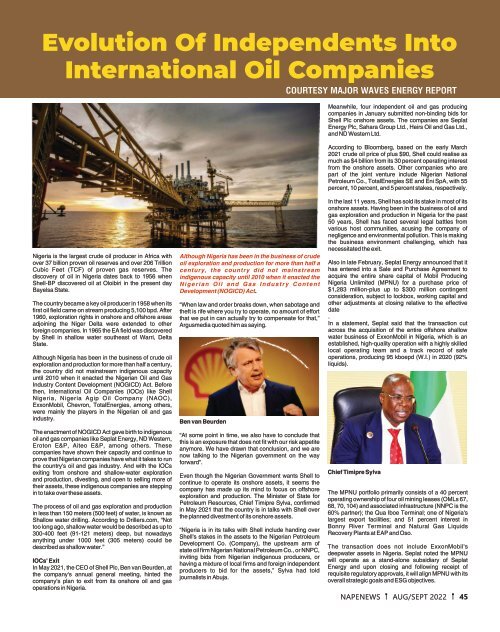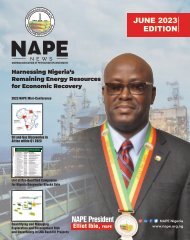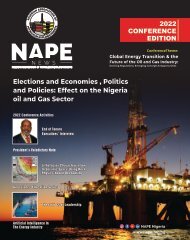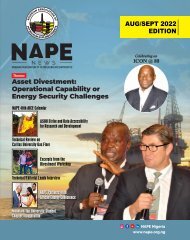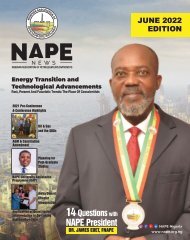Create successful ePaper yourself
Turn your PDF publications into a flip-book with our unique Google optimized e-Paper software.
Evolution Of Independents Into<br />
International Oil Companies<br />
COURTESY MAJOR WAVES ENERGY REPORT<br />
Meanwhile, four independent oil and gas producing<br />
companies in January submitted non-binding bids for<br />
Shell Plc onshore assets. The companies are Seplat<br />
Energy Plc, Sahara Group Ltd., Heirs Oil and Gas Ltd.,<br />
and ND Western Ltd.<br />
According to Bloomberg, based on the early March<br />
2021 crude oil price of plus $90, Shell could realise as<br />
much as $4 billion from its 30 percent operating interest<br />
from the onshore assets. Other companies who are<br />
part of the joint venture include Nigerian National<br />
Petroleum Co., TotalEnergies SE and Eni SpA, with 55<br />
percent, 10 percent, and 5 percent stakes, respectively.<br />
Nigeria is the largest crude oil producer in Africa with<br />
over 37 billion proven oil reserves and over 206 Trillion<br />
Cubic Feet (TCF) of proven gas reserves. The<br />
discovery of oil in Nigeria dates back to 1956 when<br />
Shell-BP discovered oil at Oloibiri in the present day<br />
Bayelsa State.<br />
The country became a key oil producer in 1958 when its<br />
first oil field came on stream producing 5,100 bpd. After<br />
1960, exploration rights in onshore and offshore areas<br />
adjoining the Niger Delta were extended to other<br />
foreign companies. In 1965 the EA field was discovered<br />
by Shell in shallow water southeast of Warri, Delta<br />
State.<br />
Although Nigeria has been in the business of crude oil<br />
exploration and production for more than half a century,<br />
the country did not mainstream indigenous capacity<br />
until 2010 when it enacted the Nigerian Oil and Gas<br />
Industry Content Development (NOGICD) Act. Before<br />
then, International Oil Companies (IOCs) like Shell<br />
Nigeria, Nigeria Agip Oil Company (NAOC),<br />
ExxonMobil, Chevron, TotalEnergies, among others,<br />
were mainly the players in the Nigerian oil and gas<br />
industry.<br />
The enactment of NOGICD Act gave birth to indigenous<br />
oil and gas companies like Seplat Energy, ND Western,<br />
Eroton E&P, Aiteo E&P, among others. These<br />
companies have shown their capacity and continue to<br />
prove that Nigerian companies have what it takes to run<br />
the country's oil and gas industry. And with the IOCs<br />
exiting from onshore and shallow-water exploration<br />
and production, divesting, and open to selling more of<br />
their assets, these indigenous companies are stepping<br />
in to take over these assets.<br />
The process of oil and gas exploration and production<br />
in less than 150 meters (500 feet) of water, is known as<br />
Shallow water drilling. According to Drillers.com, “Not<br />
too long ago, shallow water would be described as up to<br />
300-400 feet (91-121 meters) deep, but nowadays<br />
anything under 1000 feet (305 meters) could be<br />
described as shallow water.”<br />
IOCs' Exit<br />
In May 2021, the CEO of Shell Plc, Ben van Beurden, at<br />
the company's annual general meeting, hinted the<br />
company's plan to exit from its onshore oil and gas<br />
operations in Nigeria.<br />
Although Nigeria has been in the business of crude<br />
oil exploration and production for more than half a<br />
century, the country did not mainstream<br />
indigenous capacity until 2010 when it enacted the<br />
N i g e r i a n O i l a n d G a s I n d u s t r y C o n t e n t<br />
Development (NOGICD) Act.<br />
“When law and order breaks down, when sabotage and<br />
theft is rife where you try to operate, no amount of effort<br />
that we put in can actually try to compensate for that,”<br />
Argusmedia quoted him as saying.<br />
Ben van Beurden<br />
“At some point in time, we also have to conclude that<br />
this is an exposure that does not fit with our risk appetite<br />
anymore. We have drawn that conclusion, and we are<br />
now talking to the Nigerian government on the way<br />
forward”.<br />
Even though the Nigerian Government wants Shell to<br />
continue to operate its onshore assets, it seems the<br />
company has made up its mind to focus on offshore<br />
exploration and production. The Minister of State for<br />
Petroleum Resources, Chief Timipre Sylva, confirmed<br />
in May 2021 that the country is in talks with Shell over<br />
the planned divestment of its onshore assets.<br />
“Nigeria is in its talks with Shell include handing over<br />
Shell's stakes in the assets to the Nigerian Petroleum<br />
Development Co. (Company), the upstream arm of<br />
state oil firm Nigerian National Petroleum Co., or NNPC,<br />
inviting bids from Nigerian indigenous producers, or<br />
having a mixture of local firms and foreign independent<br />
producers to bid for the assets,” Sylva had told<br />
journalists in Abuja.<br />
In the last 11 years, Shell has sold its stake in most of its<br />
onshore assets. Having been in the business of oil and<br />
gas exploration and production in Nigeria for the past<br />
50 years, Shell has faced several legal battles from<br />
various host communities, acusing the company of<br />
negligence and environmental pollution. This is making<br />
the business environment challenging, which has<br />
necessitated the exit.<br />
Also in late February, Seplat Energy announced that it<br />
has entered into a Sale and Purchase Agreement to<br />
acquire the entire share capital of Mobil Producing<br />
Nigeria Unlimited (MPNU) for a purchase price of<br />
$1,283 million-plus up to $300 million contingent<br />
consideration, subject to lockbox, working capital and<br />
other adjustments at closing relative to the effective<br />
date<br />
.<br />
In a statement, Seplat said that the transaction cut<br />
across the acquisition of the entire offshore shallow<br />
water business of ExxonMobil in Nigeria, which is an<br />
established, high-quality operation with a highly skilled<br />
local operating team and a track record of safe<br />
operations, producing 95 kboepd (W.I.) in 2020 (92%<br />
liquids).<br />
Chief Timipre Sylva<br />
The MPNU portfolio primarily consists of a 40 percent<br />
operating ownership of four oil mining leases (OMLs 67,<br />
68, 70, 104) and associated infrastructure (NNPC is the<br />
60% partner); the Qua Iboe Terminal; one of Nigeria's<br />
largest export facilities; and 51 percent interest in<br />
Bonny River Terminal and Natural Gas Liquids<br />
Recovery Plants at EAP and Oso.<br />
The transaction does not include ExxonMobil's<br />
deepwater assets in Nigeria. Seplat noted the MPNU<br />
will operate as a stand-alone subsidiary of Seplat<br />
Energy and upon closing and following receipt of<br />
requisite regulatory approvals, it will align MPNU with its<br />
overall strategic goals and ESG objectives.<br />
NAPENEWS AUG/SEPT <strong>2022</strong> 45


